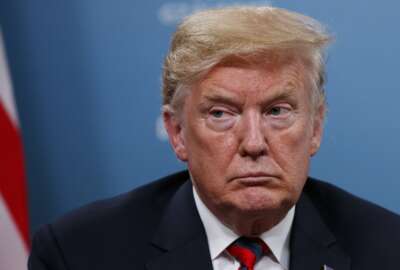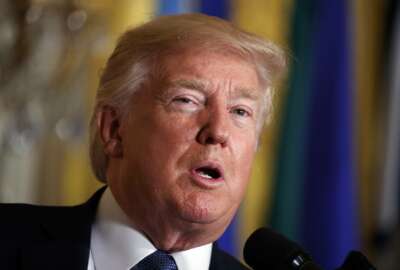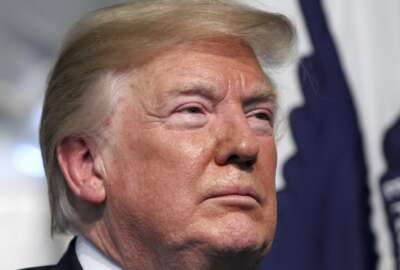
House Dems fear Trump executive orders hinder federal employee whistleblower rights
More than 20 House Democrats have their own concerns with the president's recent executive orders on the federal workforce.
The president’s trio of federal workforce executive orders have earned a wide variety of opposition from members of Congress.
Now, 23 senior House Democrats are weighing in and calling on President Donald Trump to rescind the orders he signed in late May on employee accountability, official time and collective bargaining.
This letter has signatures from the ranking members of 18 House committees, along with House Minority Speaker Nancy Pelosi (D-Calif.), Minority Whip Steny Hoyer (D-Md.), House Assistant Democratic Leader James Clyburn (D-S.C.), Democratic Caucus Chairman Joe Crowley (D-N.Y.) and Caucus Vice Chair Linda Sanchez (D-Calif.).
The Democrats raised what have become familiar arguments on the president’s three orders. They argued the EOs contradict longstanding protections designed to prevent political favoritism.
But the Democrats also argued the orders harshly target federal employees’ whistleblower rights.
“Your executive orders are the most direct and systematic attack on whistleblower protections in a generation,” the members wrote. “They strip federal employees of procedures that were put in place to protect them against retaliation by their superiors, who are often political appointees, and they deny whistleblowers assistance from their union representatives when they are punished for speaking the truth.”
By limiting official time, whistleblowers may be cut off from the help they might receive from union representatives, the House Democrats also argued.
In addition, the letter argued the president’s orders simply “pay lip service to the legal requirement to bargain in good faith.”
“The goal of your executive orders appears to be to completely eradicate unions from the federal workplace,” the members wrote.
Specifically, House Democrats criticized the decision to give agencies standardized deadlines for negotiating collective bargaining agreements. They argued the timelines set a one-size-fits all approach to collective bargaining, which may be feasible for some smaller agencies but difficult for other, larger organizations.
More than 20 House Republicans also raised their own concerns about the president’s executive orders. In a similar letter to Trump, members said they feared the orders would undo longstanding federal labor statutes and valuable partnerships between unions and agencies. Those principles, the Republicans argued, set checks and balances that protect the federal workforce and the public.
These letters of opposition also follow a series from lawsuits from more than 15 federal unions.
Both the American Federation of Government Employees and the National Treasury Employees Union (NTEU) have filed lawsuits in federal district court.
A coalition of 13 unions on Wednesday filed a third, joint lawsuit in federal district court. The group, led by the National Federation of Federal Employees (NFFE), is challenging all three orders, and the unions have broadly argued the president lacks the authority to legislate beyond the scope of existing law.
Both NTEU and NFFE filed injunctions to immediately block the provisional changes of the EOs from being implemented. The unions said they hope to see initial but temporary relief from the orders before the Office of Personnel Management issue regulations that direct agencies how to implement them more specifically.
Copyright © 2025 Federal News Network. All rights reserved. This website is not intended for users located within the European Economic Area.
Nicole Ogrysko is a reporter for Federal News Network focusing on the federal workforce and federal pay and benefits.
Follow @nogryskoWFED






